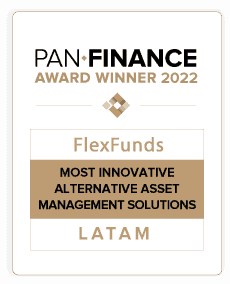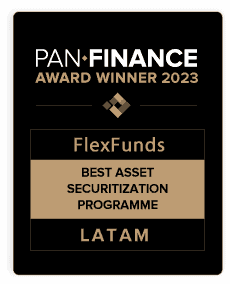- Financial vehicles allow investors to access opportunities that may be beyond their individual reach and manage risk through diversification.
- With the digitization ‘boom’, the landscape of financial vehicles has also expanded.
- Financial education is key to making conscious and informed decisions.
- FlexFunds makes the issuance of investment vehicles a simple process for its clients.
With various alternatives and instruments in the financial market, people can feel overwhelmed by so many concepts and make hasty investment decisions without truly understanding the structure and purpose of each of these vehicles. Below, FlexFunds explains what a financial vehicle is and the different types available in the current market.
What is a financial vehicle?
In practical terms, a financial vehicle is a type of instrument structured to seize investment opportunities in the market and generate returns from resources pooled by multiple investors.
Financial vehicles expose investors to markets and allow them to participate with a minimum amount in various alternatives in real estate, commodities, corporate or government debt instruments, or stocks.
Financial vehicles have the quality of combining different types of assets, enabling investors not only to maintain a diversified portfolio but also to mitigate risk according to each individual’s profile and the horizon set to achieve their objectives.
In any case, investors should seek guidance from qualified financial professionals before making investment decisions.
Investing in various financial vehicles requires understanding their structure, terms, and the costs associated with managing them, as specialized administrators charge fees for the services behind their operations.
The landscape of financial vehicles
The landscape of financial vehicles changed due to the 2007-2008 financial crisis, which led to stricter rules in different instruments and greater conditions for investors in businesses such as hedge funds.
For example, it is estimated that 58% of adults in the United States invested in the stock market last year1, down from the highs reached in 2007 when it was 65%, before the collapse of the real estate bubble in that country, according to figures from the German statistics portal Statista.
With the digitization ‘boom’, the map of financial vehicles has also expanded, bringing diversification and new alternatives for investors. Thanks to the emergence of digital platforms, investors now have exposure to different types of assets.
According to a report by Boston Consulting Group (BCG) and QED Investors, the techno-financial solutions market could multiply its revenues by six, increasing from $245 billion to $1.5 trillion by 2030, especially with the momentum of the Asia-Pacific region2.
The document, titled “Global Fintech 2023: Reimagining the Future of Finance,” indicates that neobanks (the name given to technology-backed entities) will become increasingly relevant in a challenging environment for access to the financial system.
In fact, it estimates that there are currently around 2.8 billion underbanked adults in the world, with 50% concentrated in emerging economies. It also projects an additional 1.5 billion people without banking services, with 75% of these individuals in emerging countries.
In this context, financial vehicles continue to diversify and expand their horizons to serve a larger group of people with diverse savings or capital maximization needs. This has led many financial institutions to democratize access and break down barriers.
Diversity in the financial vehicle market
The offering of financial vehicles includes various options depending on the investors’ profiles and whether they are more conservative or higher-risk instruments. The choice will also depend on each person’s investment horizon, liquidity requirements, the basket of assets chosen, the type of management, and the associated costs.
The two major groups of investment vehicles include fixed-income vehicles, which channel investors’ resources for a specified period with the agreement to deliver predefined returns. Additionally, there are equity vehicles that depend on market fluctuations and typically offer better returns with a higher level of exposure to risk.
The performance of these financial vehicles will depend on the structure of each one, the management strategy, the basket of assets they focus on, the degree of exposure, and the level of leverage of compound interest they employ.
Among the most popular financial vehicles are fixed-term deposit certificates (CDTs), which generate returns at a rate and term defined by the parties, or bonds, which are a type of security issued by companies or governments for capital raising purposes.
These securities are packaged and issued so entities or governments can leverage themselves. Investors who fund them receive returns in the form of periodic interest.
Other alternatives include mutual funds, which pool capital from different types of investors to be managed by professional financial managers who seek to generate returns by purchasing a diversified portfolio of stocks, bonds, or other assets.
Exchange-traded funds (ETFs) also gather different types of assets to be traded on the stock market as shares.
Meanwhile, real estate investment funds focus on investments in various types of real estate to generate returns through appreciation, rental income, and more.
Structured products combine traditional assets with financial derivatives to provide exposure to certain markets or specific strategies.
The list of more specialized financial vehicles also includes hedge funds, which aim to capitalize on both bullish and bearish markets but also assume greater risks. These are primarily targeted at institutional and accredited investors.
Given the diversity and complexity of each vehicle, financial education is key to making conscious and informed decisions about the characteristics and risks associated with each type to structure solid and diversified portfolios. The important thing is to have all the elements of judgment so that investors can harness the potential of each of these financial vehicles and achieve their financial goals.
FlexFunds is a leading provider in the design and launch of investment vehicles, offering one of the most advanced asset securitization programs, improving the distribution of investment strategies, and facilitating access for international investors quickly and cost-efficiently.
Among FlexFunds’ solutions are:
FlexPortfolio: An unregulated ETP that securitizes liquid listed assets, such as stocks, bonds, options, Forex, futures, and ETFs.
FlexFeeder: Unregulated investment vehicle that securitizes alternative assets and fund shares, such as private investment funds, real estate investment funds, or hedge funds.
Flex Private Program: Provides large clients with the management of exclusive ETP issuers, offering them more flexibility and customization.
The launch time for these ETPs is half that of other market alternatives. FlexFunds’ ETPs allow you to have a unique ISIN code that is distributable through Euroclear.
If you want to learn more about the asset securitization process and how you can benefit from it, please do not hesitate to contact our team.
Sources:
- https://www.statista.com/statistics/270034/percentage-of-us-adults-to-have-money-invested-in-the-stock-market/
- https://www.bcg.com/press/3may2023-fintech-1-5-trillion-industry-by-2030







